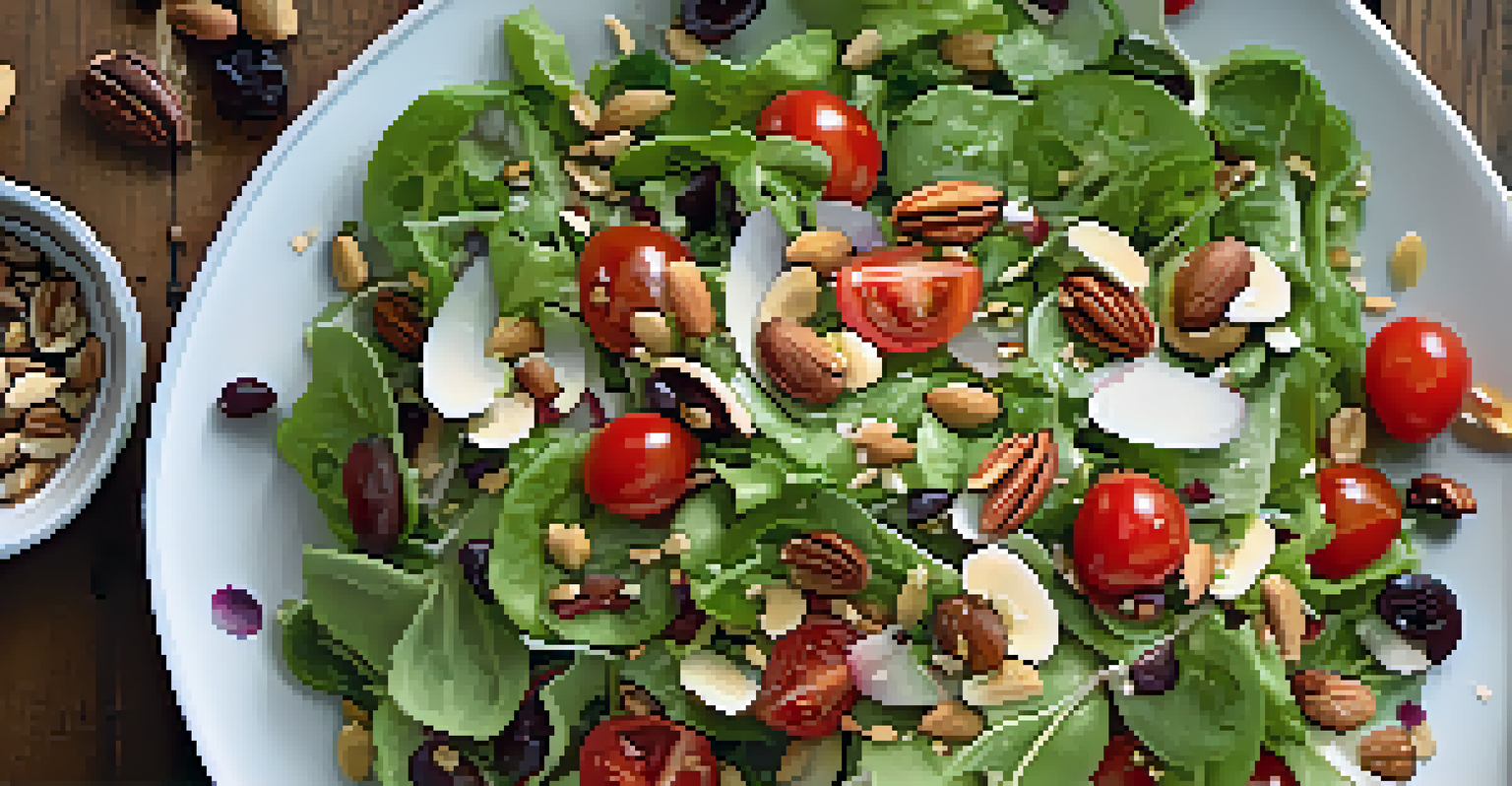Nuts and Seeds: Nutrient-Dense Plant-Based Protein Options

Why Choose Nuts and Seeds for Protein?
Nuts and seeds are often overlooked, but they pack a powerful punch when it comes to plant-based protein. They are not only a great source of protein but also provide healthy fats, fiber, and a wide range of vitamins and minerals. Including these in your diet can help meet your protein needs while also supporting overall health.
Eating nuts and seeds can be a great way to boost your health, providing essential nutrients while being a sustainable choice for the planet.
For those following a vegetarian or vegan diet, nuts and seeds are essential. They offer a complete amino acid profile when combined with other plant foods. This means you can get all the necessary building blocks for your body without relying on animal products.
Related Resource
Moreover, nuts and seeds are incredibly versatile. You can sprinkle them on salads, blend them into smoothies, or enjoy them as a snack. This variety makes it easy to incorporate them into your daily meals.
Popular Nuts and Their Benefits
Almonds, walnuts, and cashews are just a few popular nuts that provide substantial health benefits. Almonds, for instance, are rich in vitamin E and magnesium, which can help improve heart health. Walnuts are known for their high omega-3 fatty acid content, which is essential for brain function.

Cashews, with their creamy texture, are not only delicious but also contain important minerals like zinc and iron. These minerals are vital for immune function and energy production. Incorporating a variety of nuts into your diet can help ensure you get a range of nutrients.
Nuts and Seeds: Protein Powerhouses
These nutrient-rich foods provide plant-based protein along with healthy fats, fiber, and essential vitamins and minerals.
A convenient way to enjoy nuts is through nut butter. Spread it on whole-grain toast or blend it into your oatmeal for a protein boost. Just be mindful of portion sizes, as nuts are calorie-dense.
Nutrient-Rich Seeds to Include in Your Diet
Seeds, including chia, flax, and pumpkin seeds, are often packed with nutrients that rival those of nuts. For example, chia seeds are an excellent source of omega-3 fatty acids, fiber, and antioxidants. They also absorb liquid, making them a great addition to smoothies or puddings for added texture.
Let food be thy medicine and medicine be thy food.
Flaxseeds are another powerhouse. They are known for their high lignan content, which can help reduce inflammation. Ground flaxseeds can be added to baked goods or sprinkled on yogurt for a nutrient boost.
Related Resource
Pumpkin seeds, or pepitas, are rich in magnesium, iron, and zinc. They make for a crunchy topping on salads or can be eaten as a snack on their own. Including a variety of seeds can enhance your meals and provide a range of health benefits.
How to Incorporate Nuts and Seeds into Your Meals
Incorporating nuts and seeds into your daily meals can be simple and enjoyable. Start by adding a handful of nuts to your morning oatmeal or yogurt for a satisfying crunch. You can also blend seeds into smoothies for an added nutrient boost.
Consider using nut butters as a spread or in baking recipes. They can add flavor and nutrition to cookies, muffins, and pancakes. Just remember to choose natural varieties without added sugars or oils for the healthiest option.
Health Benefits of Nuts and Seeds
Incorporating a variety of nuts and seeds can enhance nutrition, support heart health, and provide vital minerals for overall well-being.
For a quick snack, keep a mix of nuts and seeds on hand. This not only satisfies hunger but also provides sustained energy throughout the day. You might find that having healthy snacks readily available helps you make better food choices.
The Environmental Impact of Nuts and Seeds
Choosing nuts and seeds as protein sources can also positively impact the environment. Plant-based proteins generally require fewer resources to produce compared to animal proteins, making them a more sustainable choice. This can lead to a lower carbon footprint and less environmental degradation.
For example, almond farming, while resource-intensive in terms of water, still has a lower overall environmental impact than beef production. Similarly, seeds like flax and chia can be grown with relatively low resource inputs.
Related Resource
By opting for nuts and seeds, you're not only nourishing your body but also supporting more sustainable food systems. It's a win-win for both your health and the planet.
Potential Allergies and Considerations
While nuts and seeds are nutritious, it's important to be aware of potential allergies. Tree nuts, such as almonds and cashews, are common allergens and can cause severe reactions in some individuals. Always check with a healthcare professional if you suspect a nut allergy.
Seeds, on the other hand, are generally less allergenic. However, it's wise to introduce them gradually into your diet, especially if you haven't consumed them before. This way, you can monitor for any adverse reactions.
Sustainable Protein Choices
Choosing nuts and seeds as protein sources can reduce environmental impact compared to animal proteins, promoting a more sustainable food system.
If you're unsure about which nuts and seeds to include in your diet, consider consulting a registered dietitian. They can help tailor your choices based on your individual health needs and preferences.
Final Thoughts on Nuts and Seeds
Incorporating a variety of nuts and seeds into your diet can enhance your nutrition and support your health goals. They're not only delicious and versatile but also packed with essential nutrients that can benefit your body in numerous ways. From boosting protein intake to providing healthy fats, these little powerhouses truly deserve a spot in your pantry.
As you explore different ways to enjoy nuts and seeds, remember that moderation is key. While they offer many health benefits, they are calorie-dense, so it's important to be mindful of portion sizes. A small handful can go a long way in providing the nutrients you need.

Ultimately, whether you're a long-time fan of nuts and seeds or just starting to explore their benefits, there's no denying their value as part of a balanced diet. Embrace their deliciousness, and enjoy the health perks they bring!